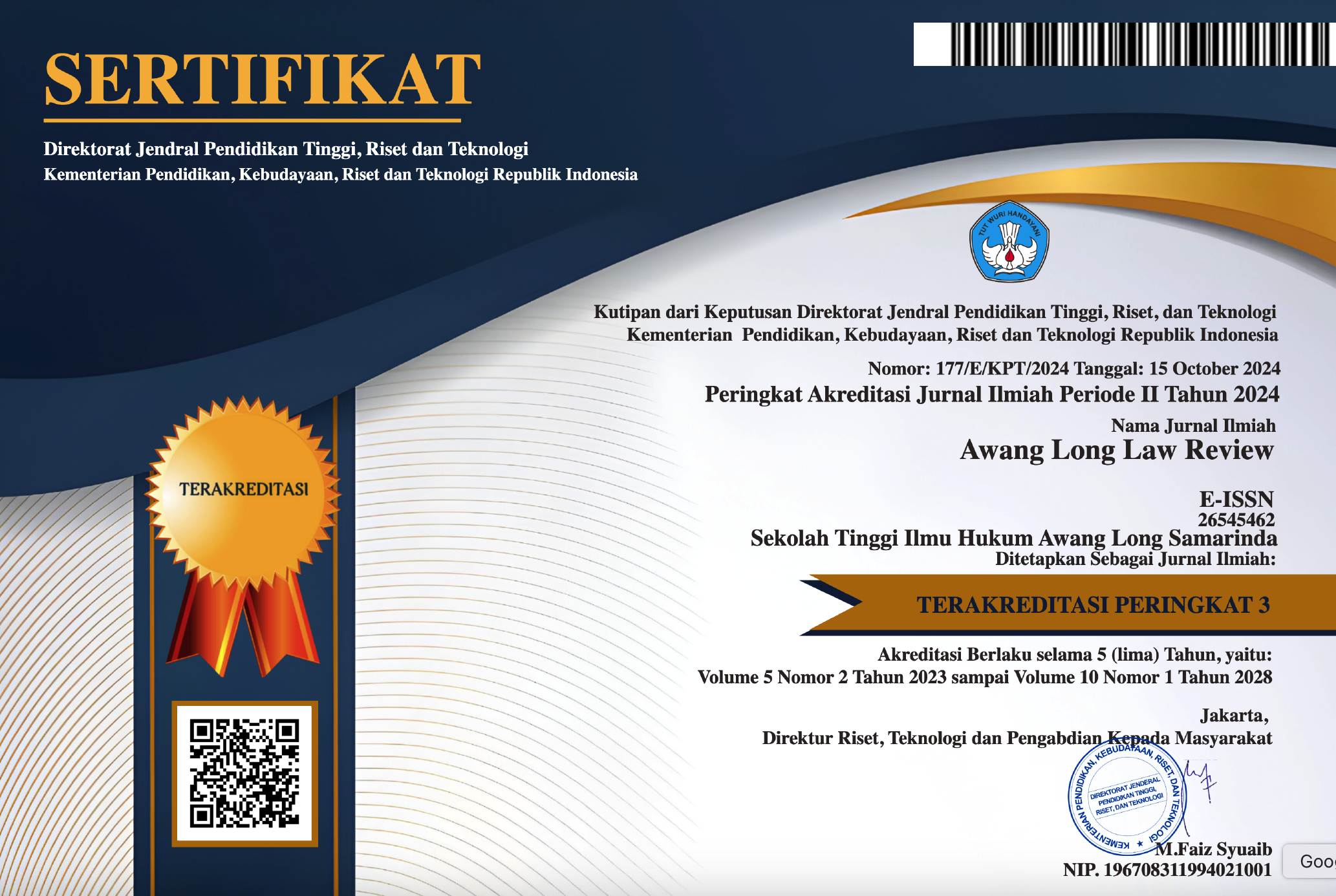AN UNREASONABLE PURCHASE OF GOODS: A CRIMINAL LAW PERSPECTIVE
Abstract
The purpose of this study is to compare the criminal law regarding the dishonest purchase of goods or receipt of goods resulting or also known as fencing from crime between the Indonesian Criminal Code and the Penal Code of Singapore. This research uses a normative juridical method, so the data used is secondary. This data consists of the Indonesian Criminal Code and the Singapore Penal Code, as well as journals relevant to the problem. The novelty of this research is that the formulation of criminal sanctions is not only alternative but can be imposed cumulatively, and there is a separate formulation regarding the receipt of stolen motor vehicle goods. The research results show that purchasing criminal goods or receiving stolen property or fencing is regulated under Article 480 of the Indonesian Criminal Code and Article 411 of the Singapore Criminal Code. Both define the offense as intentional by a responsible perpetrator. Criminal sanctions under the Indonesian Criminal Code are alternative, and if fencing occurs, there is jurisprudence as source of formal law. While those under the Singapore Penal Code are alternative or cumulative. Receiving stolen property, particularly motor vehicles, carries cumulative penalties, plus a ban on holding or obtaining a driver's license, imposed by the court upon release from prison. The research concludes that fencing is a violation in both Indonesia and Singapore. The only differences lie in the form of punishment stipulated in the Criminal Code and the formulation of receiving stolen property for motor vehicles. The research concludes that fencing is a violation in both Indonesia and Singapore. The only differences lie in the form of punishment stipulated in the Criminal Code and the formulation of receiving stolen property for motor vehicles.
Downloads
References
Ahmad, A. A. (2024). Analysis of The Expansion of The Principle of Legality In Renewing Criminal Law. Domus Legalis Cogitatio, 1(1), 21- 35. doi:10.24002/dlc.v1i1.7640
Andri Winjaya Laksana, e. (2024). The Liability of Criminal Law for Perpetrators of Goods Embezzlement. Jurnal Justice Dialectica, 2(2), 70-83. doi:: 10.70720/jjd.v2i2.50
Garner, B. A. (2021). Black Law Dictionary’. India:: St. Paul Academic.
George Baldwin, S. Y. (2025). Mental health and sentencing: How are judicial decisions made in light of the judgement of R v Vowles?’,. International Journal of Law and Psychiatry,, 98, 1 - 12. doi:https://doi.org/10.1016/j.ijlp.2025.102071
Harefa, U. (2023). Dasar - Dasar Hukum Pidana Indosia: Pasca Berlakunya KUHP Nasional. Sukobumi: CV. Jejak.
Hiariej, E. O. (2021). Prinsip - prinsip Hukum Pidana (Edisi Revisi). Yogyakarta: Cahaya Atma Putaka.
Hutagalung, B. P. (2024). Hukum Pidana dan Yurisrudensi: Banding da Kasasi atas Putusan Bebas. Indramayu, West Java, : Adanu Abimata.
Indonesia. (1847, April 30). https://jdih.mahkamahagung.go.id. Retrieved May 05, 2025, from KUH Perdata: https://jdih.mahkamahagung.go.id/legal-product/kitab-undang-undang-hukum-perdata/detail
Indonesian Government. (1946, February 26). KUHP. Retrieved May 05, 2025, from jdih.mahkamahagung.go,id: https://jdih.mahkamahagung.go.id/legal-product/kitab-undang-undang-hukum-pidana/detail
Indonesian Government. (1955, May 15). Undang-undang DaruratNo 7 Tahun 1955. Retrieved May 05, 2025, from bpk.go.id: https://peraturan.bpk.go.id/Details/52990/uudrt-no-7-tahun-1955
Kartiko, K. &. (20020). Asas Kesalahan Dalam Hukum Pidana Pilar Perlindungan Hak Asasi Manusia’,. Prosiding Fh Universitas Suryakancana Tahun 2020 (pp. 1 -11). Cianjur, West Java: Fakulta Hukum, Universitas Suryakancana.
Liam Quinn, e. a. (2023). The relationship between variation in price and theft rates of consumer and commodity goods over time: a systematic review. Journal of Experimental Criminology, 19, 365-395. doi:https://doi.org/10.1007/s11292-021-09493-8
Mahamagung Agung Republic of Indonesia. (2018). Yurisprudensi No3/Yur/Pid/2018. Retrieved from mahkamahagung.go.id.https://putusan3.mahkamahagung.go.id/yurisprudensi/detail/11eae848e74 4d10c04c313633373230.html.
Nicholas Hallett, H. N. (2024). Criminal Intent and Psychiatric Evidence. BJPsych Advances, 30(6), 357-367. doi:https://doi.org/10.1192/bja.2024.49
Piet Hein van Kempen, M. K. (2023). Legality of Sentencing and the Need for a Catalogue of Principles. Netherlands: Eleven.
Pujianto, L. (2025). Pengantar hukum Pidana Indonesia. Yogyakarta: Green Putaka Indonesia.
Rights, U. N. (1998, July 19). Rome Statute of the International Criminal Court. Retrieved May 05, 2025, from ohchr.org: https://www.ohchr.org/en/instruments-mechanisms/instruments/rome-statute-international-crimiinal-court
Riswan, Q. A. (2025). Penelitian Hukum Normatif. Jambi: Sonpedia Publishing Indonesia.
Septhian Eka Adiyatma, N. G. (2020). Society and Law Enforcement Personnel in Trading Stolen Goods. Law Research Review Quarterly, 101-116. doi:https://doi.org/10.15294/lrrq.v6i2.31107
Singapore Goverment. (2021, Desember 31). https://sso.agc.gov.sg/act/pc1871. Retrieved May 05, 2025, from The Statutes of The Republic of Singapore of Code Penal 1871: https://sso.agc.gov.sg/Act/PC1871?ProvIds=pr410-&ViewType=Advance&Phrase=t(eft&WiAl=1
Singapore legal advice. (2025, July 13). singaporelegaladvice.com. Retrieved July 26, 2025, from Penalties For Buying Stolen Goods in Singapore: https://singaporelegaladvice.com/law-articles/penalties-buying-stolen-goods-singapore/
Varuhas, J. N. (2020). The Principle of Legality’,. The Cambridge Law Journal, 79(3), 578-614. doi:10.1017/S0008197320000598
Copyright (c) 2025 Kuswardani, Marisa Kurnianingsih, Mazlena Mohamad Hussain, Andria Luhur Prokosa, Fahmi Fairuzzaman

This work is licensed under a Creative Commons Attribution-ShareAlike 4.0 International License.







